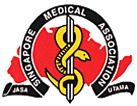
THESMANEWS
Present Issue
Past Issues
Journals
Present Issue
Past Issues
Letters to the Editor

OPENING ADDRESS AT THE 1997 ETHICS CONVENTION
Delivered by Professor N Balachandran,
President, SMC
I am deeply honoured and privileged to be invited by the SMA Council to be the Guest of Honour at your first Ethics Convention. The SIngapore Medical Council issued its revised Ethical Code in May 1995. In drawing up a Code of Ethics, we noted that the SMA Ethical Code was much more detailed. In some of our inquiries, both these ethical codes guided us in our decision making. The guidelines on sign-boards, name-plates, name-cards and stationery and professional announcements were simple enough. The Singapore Medical Association, through its newsletter and the SMJ were able to inform members of the profession on the commencement or change of practices among its members. Complaints relating to signboards and name-plates are issues that reflect a need for standardisation. There is a need to observe professional decorum.
The public must have direct access to medical care and it has always been hoped that patients will be referred to specialists through their family physicians. However, in our present set-up in Singapore, this is not often possible nor should be made mandatory. There is often a patient to patient referral and people hear about doctors and would like to see them without a referral. After discussions with the General Medical Council, the Singapore Medical Council issued a “Guide on the Provision of Information”. The medical profession has a duty to educate members of the public and today with information technology, patients too want to know about their illnesses and the facilities that are available in clinics and hospitals. With an increasing affluent population, patients are willing to pay for and seek the best treatment that is available.
Hence the doctors have a important role in providing education and information to members of the public, not only on the preventive aspects of medicine but also on self care of common ailments like diabetes, hypertension, screening for malignanacy and leading a healthy life-style. There are many public forums today, not only in government and university hospitals, but also in our private hospitals. Much of this information is already made available in the Internet, newspapers, and magazines.
The medical profession and the pharmaceutical companies and manufacturers of instruments and implants must work closely in delivering health care. In this pursuit, several ethical dilemmas may arise. With development of high technology, doctors may be sponsored by various companies to give talks and hold workshops and one may accept it as a form of continuing education. Most of our conferences, need sponsorships from pharmaceuticals companies. Doctors too have been sponsored to attend conferences and workshops by these companies. It is important that both doctors and the pharmaceutical industry do not become overly obligated to one another as a result. The Medical Directors of public hospitals and the Academy of Medicine have drawn strict guidelines so that it may not be construed that doctors who attend such meetings influenced the tender boards and showed preference for certain drugs or surgical implants. Specialists are often asked to give expert opinions in the courts and also before the Medical Council. Specialists in Singapore have an onerous duty to be truthful and fair. They should not let lawyers or clients influence their honest opinions.
Doctors have ethical responsibilities and their only concern must be the welfare of their patients. Any other consideration like financial gains must be secondary. We must be conscious of this fact at all times and any abuse of such privileges for monetary gains constitutes “infamous conduct”.
The new Medical Registration Bill was passed in Parliament in August 1997. We have now almost completed drawing up the Revised Regulations and it is hoped that the Act will come into force early next year. You are all probably aware that there will be a Complanits Panel and a Complaints Committee. Besides, members of the Council and a representative from the public, senior members of the medical profession will be asked to serve not only on the Complaints Panel but also on the Complaints Committee. Likewise, there will be a Committee of Inquiry and besides two members of the Council and a member of the public, there will be a representative from the medical profession. There will also be a Health Committee. It is hoped that senior members of the profession when called upon by the medical council to serve on the Inquiry Committee, the Health Committee or the Complaints Committee will come forward to serve their colleagues and the public. The Council has the duty to maintain public confidence and public interest must be foremost in their minds.
Medicine today is moving into the realms of a Health Industry. In April 1991, the Chairman of the Government Parliamentary Committee for National Development stated “that medicine should not turn doctors into mercenary technocrats”. The temptation to use medical technology for financial gains should be resisted. The medical profession is now being closely watched by an educated and affluent public, and we professionals need to uphold good ethical standards. Ours is the noblest of all professions and as doctors we are teachers and our contribution must be to the welfare of the community. We have to be well informed and concerned that the interests of our patients must always prevail over the interests of Science and Finance.